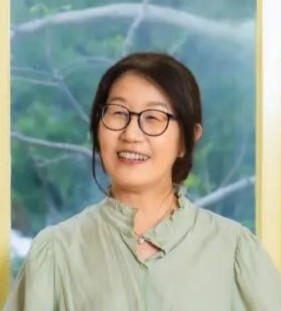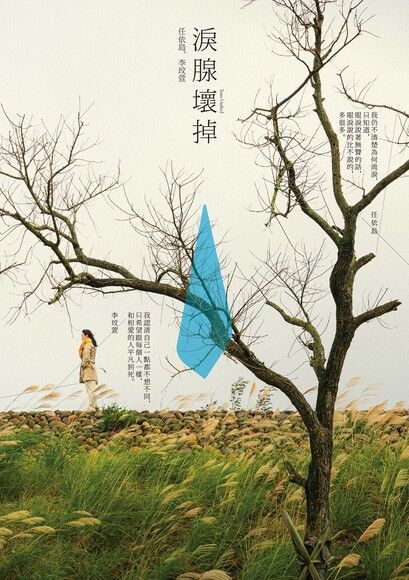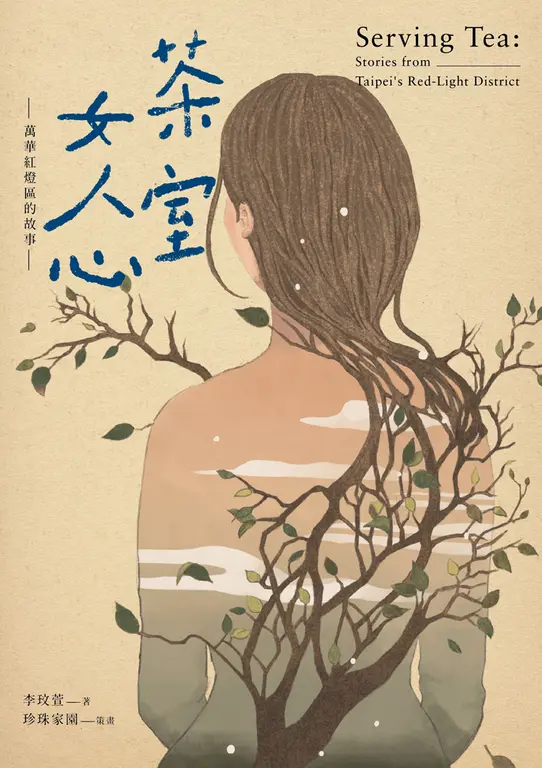
Lee Win-Shine
李玟萱
李玟萱
Born in Kaohsiung in 1977, Lee Win-Shine holds a master’s degree in continuing education from National Chi Nan University, and is a recipient of the Taipei International Book Exhibition prize for non-fiction. Her writing spans essays, interviews, song lyrics, and film reviews. Her first book, March 4th, the Day I Lost You, had been adapted into a TV series. Her second book, Life Stories of the Homeless in Taiwan won the Taipei International Book Exhibition Award and has sold over 10,000 copies. Her recent work, Tears Unshed, is a collaborative diary co-written with Ren, Yi-Dao, a fellow Taipei International Book Exhibition Award winner.
Works

“Through their back-and-forth correspondence, we witness their profound self-examination, fragmented experiences of suffering, and the wonder of discovering "another world" through their pain.”–HenBook’s review
Sometimes, when pain reaches its peak, even language loses its power—spoken words become redundant in the face of such profound suffering.
After her boyfriend J of ten years passed away, Lee Win-Shine felt as though she had entered an endless, pitch-black tunnel—no light, no path, no desire to speak to anyone. Years later, her husband appeared, and she embraced love and happiness once more. Yet just a few years into marriage, her husband suffered a stroke, leaving him unable to speak or swallow. As life crashed down around her again, she lost her ability to feel the world and could no longer write...
Ren, Yi-Dao, who considered himself ordinary, crawled forward within the education system's confines. After the double blow of heartbreak and dropping out of school, he slowly picked himself up from failure. Just as he finally found his calling in psychology work, cancer struck... A life he thought was moving forward suddenly slowed to what felt like a complete stop...
Tears Unshed presents 24 letters—12 from each writer, addressed both to each other and to their own fragile selves. Brought together by the mountains, both writers have endured life's deepest wounds, yet they refused to let themselves fall further. In the quiet process of healing—and through the courage to receive care—they rediscover the strength to keep walking, one step at a time.
This is a journey of rehabilitation born from their lived experiences—rehabilitation of both body and spirit, and rehabilitation of words themselves. Together, they hope that "when the world is drenched in torrential rain, their words can provide shelter, even if just for a moment, for someone in need."

English Translation Available
Rights sold: Korean (Nuhang)
Nominated for the 2023 Openbook Awards
Selected for 2024 Books from Taiwan
During an era of rising economic fortunes and seeming prosperity, women from Taiwan’s lower classes were often sacrificed at the altar of progress. In order to survive, many had no choice but to seek work in the sex-industry. Long viewed as disgraced women, now, it is finally time to hear their stories.
During the post-war baby boom, many Taiwanese households lacked the economic means to give all of their children a proper upbringing. In a society that valued boys over girls, daughters were often forced to leave school and join the workforce so that economic resources could be focused on educating sons. Struggling to survive alone in the city, and lacking in education, these young women were at high risk of slipping into an endless cycle of poverty and abuse. In moving and readable prose, Teahouse Ladies tells the life stories of the women who were sacrificed at the twin altars of patriarchy and progress.
To gather these stories, writer Lee Win-Shine interviewed twelve long-term residents of Taipei’s Wanhua District. Most were not born locally. Rather, in an era that gave them few choices, they found their way to Wanhua, a place synonymous with Taipei’s lower classes, and a notorious red-light district due to the “teahouses” hidden away in its alleys. More than just venues for enjoying tea, alcohol, and conversation, the Wanhua teahouses provided pretty girls who were paid to drink with the clientele, nakasi bands led by sultry songstresses, and prostitution.
Chapter by chapter, these teahouse girls relate their stories. Some were sold into prostitution to pay family debts. Some had stable lives that were destroyed by a partner’s gambling addiction. Some were forced by their own families into marriages with abusive husbands, and, from there, they slipped ever deeper into the abyss of domestic violence. Yet, with assistance from a variety of non-profit organizations, including the sponsors of this book project, these women were eventually able to rebuild their trust in others, and regain their sense of personal value.
Author Lee Win-Shine is a recipient of the Taipei International Book Exhibition non-fiction prize. With assistance from the Pearl Family Garden Women’s Center, she was able to conduct in-person interviews with these former teahouse ladies, finally giving a voice to the women who survived the poverty of Wanhua, the disdain of society, and even the prejudice of close family and friends.